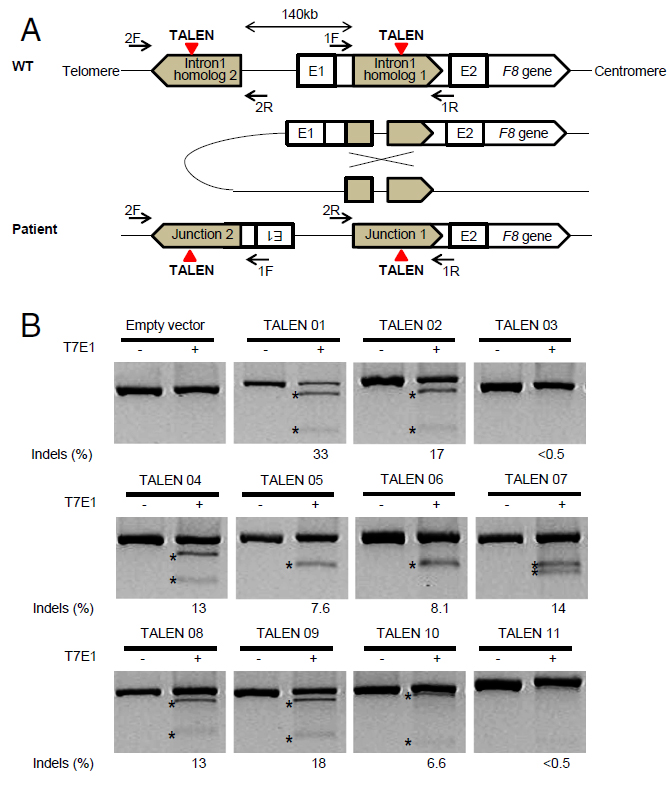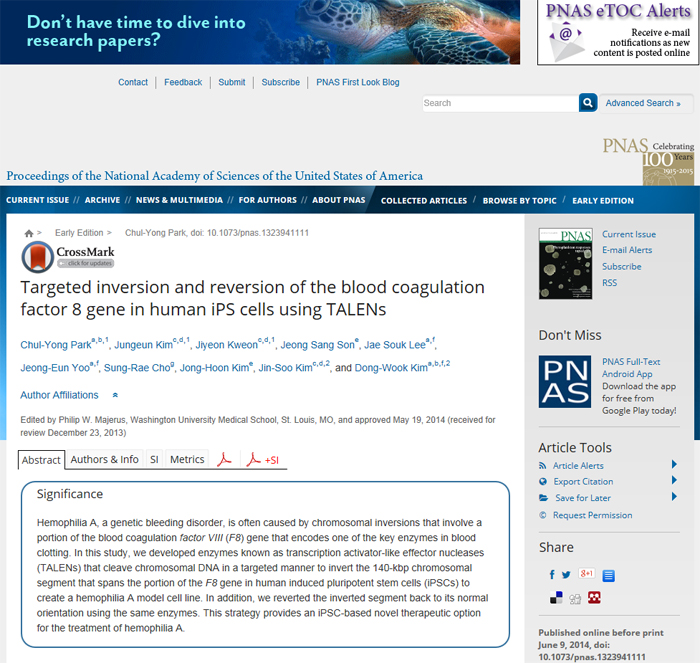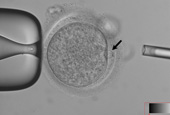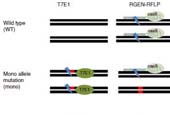Researchers have developed a way to repair broken cells, a step forward in gene therapy. Specifically, the scientists have found a way to correct the inverted segment in human induced pluripotent stem cells (iPSCs) and change it back to its normal orientation by using a transcription activator-like effector nuclease (TALEN). The joint research team, consisting of the Yonsei University Medical School and the Institute for Basic Sciences (IBS), conducted the research, and the findings may open doors to the development of gene therapy solutions.
There are often chromosome inversions, as well as omissions or repetitions, found in the study of DNA sequences in human genes. These kinds of structural variations can cause diseases.
Hemophilia A, one of the more common genetic bleeding disorders, is caused by various mutations in the blood coagulation factor F8 gene. Two different types of chromosomal inversions that involve a portion of the F8 gene are most frequent.
The researchers used a TALEN pair to invert a chromosomal segment spanning a portion of the F8 gene in human iPSCs to create a hemophilia A model cell line. They then reverted the inverted segment back to its normal orientation in the model iPSCs using the same TALEN pair. Afterward, they confirmed the manifestation of the blood coagulation factor F8 mRNA in cells derived from the reverted iPSCs lines.
TALEN is one of the "genetic scissors" and is a useful tool for generating gene mutations. Genetic scissors can literally cut out a specific fragment of the genome, which subsequently can be deleted, while other genes can be inserted in place of the deleted fragments.

This is the first time to find that genetic scissors, or TALEN, could be used to invert chromosomal segments in human iPSCs and revert the segments again back to their normal orientation.
The medical community has had high expectations that human iPSCs could be used to develop gene therapy medicines, since they can avoid immune resistance. This research is considered a breakthrough, as the scientists have found a way to reverse the mutations caused by the inversion of the chromosomal segments by using TALEN. This opens the door to developing treatments for genetic disorders and gene therapy medicine.
"In the mid- to long-term, our goal is to develop gene therapy medicines to correct genetic disorders in the human iPSCs of hemophilia patients," said a senior researcher on the team.
The research was undertaken with the support of bio and medical technology development funds provided by the Ministry of Science, ICT and Future Planning. The results were published in the online version of the Proceedings of the National Academy of Sciences (PNAS) on June 10.

By Limb Jae-un
Korea.net Staff Writer
jun2@korea.kr

There are often chromosome inversions, as well as omissions or repetitions, found in the study of DNA sequences in human genes. These kinds of structural variations can cause diseases.
Hemophilia A, one of the more common genetic bleeding disorders, is caused by various mutations in the blood coagulation factor F8 gene. Two different types of chromosomal inversions that involve a portion of the F8 gene are most frequent.
The researchers used a TALEN pair to invert a chromosomal segment spanning a portion of the F8 gene in human iPSCs to create a hemophilia A model cell line. They then reverted the inverted segment back to its normal orientation in the model iPSCs using the same TALEN pair. Afterward, they confirmed the manifestation of the blood coagulation factor F8 mRNA in cells derived from the reverted iPSCs lines.
TALEN is one of the "genetic scissors" and is a useful tool for generating gene mutations. Genetic scissors can literally cut out a specific fragment of the genome, which subsequently can be deleted, while other genes can be inserted in place of the deleted fragments.

Diagrams show how 'genetic scissors' operate. The researchers created a TALEN pair to invert a chromosomal segment in the human iPSCs to create a hemophilia A model cell line. They then injected the TALEN into the inverted stem segment. Afterward, they were able to revert the inverted segments, changing them back to normal. (image courtesy of the Proceedings of the National Academy of Sciences)
This is the first time to find that genetic scissors, or TALEN, could be used to invert chromosomal segments in human iPSCs and revert the segments again back to their normal orientation.
The medical community has had high expectations that human iPSCs could be used to develop gene therapy medicines, since they can avoid immune resistance. This research is considered a breakthrough, as the scientists have found a way to reverse the mutations caused by the inversion of the chromosomal segments by using TALEN. This opens the door to developing treatments for genetic disorders and gene therapy medicine.
"In the mid- to long-term, our goal is to develop gene therapy medicines to correct genetic disorders in the human iPSCs of hemophilia patients," said a senior researcher on the team.
The research was undertaken with the support of bio and medical technology development funds provided by the Ministry of Science, ICT and Future Planning. The results were published in the online version of the Proceedings of the National Academy of Sciences (PNAS) on June 10.

Research results titled, 'Targeted inversion and reversion of the blood coagulation factor 8 gene in human iPS cells using TALENs,' was published online in the Proceedings of the National Academy of Sciences (PNAS) on June 10.
By Limb Jae-un
Korea.net Staff Writer
jun2@korea.kr



